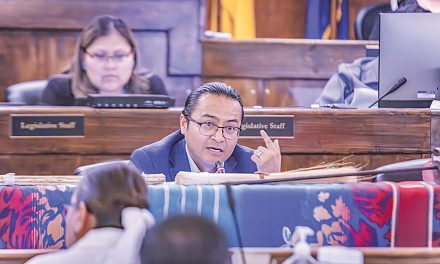
50 Years Ago: Unity in police demands for higher pay, overtime called into question
For the past two weeks, the big story on the Navajo Reservation was efforts by members of the Navajo Police Department to give officers a 25% increase in pay and to start paying overtime.
It’s obvious that the police are serious about their demands. They conducted a one-day walkout which saw more than 100 police officers to walk off the job for 10 hours forcing tribal leaders to set up a task force to look into their demands.
The officers were appeased by the creation of the task force and demanded changes by the beginning of the tribal fair or they would make their anger known during the fair.
This has now gone to a whole new level with police threatening to do something – possibly another walkout – during the fair. But tribal officials said if they did anything during the fair, the leaders of the police movement would be fired.
Up until now, it seemed the police officers were united in the effort to improve how they were treated by the government, but there were indications that not all members of the police force were supportive of this effort.
Emerson Largo, a captain in Crownpoint, wrote a letter to tribal officials, which was immediately leaked to the press, saying members of his district would not take part in any effort that would affect their ability to provide the best service possible to residents of their district.
Largo said his officers felt the threats to be “unnecessary and dangerous.”
While they also think the police officer’s demands are needed, they want the officers to get these changes implemented by following tribal law and depending on the promises of tribal officials to do what they could to meet the demands.
Navajo Tribal Chairman Peter MacDonald, of course, was delighted to see the Crownpoint officers break away from their police brothers.
“They have decided to stand up for their oath of service and they should be commented for taking this position,” he said.
The group promoting the movement took immediate action, releasing a statement saying they had talked to the officers in Crownpoint and found that the great majority supported taking action if their demands weren’t met.
The statement by Largo reflected only his position as well as a handful of his buddies in the Crownpoint area.
Free tuition in Colo. stays
At least one dispute ended this week as Colorado officials gave up their effort to start making Native American students going to Fort Lewis pay tuition like all other students.
Some members of the state Legislature had said this past summer they would pass a new law requiring Native American students to pay tuition when they signed up for class in August.
They had an uphill battle to implement this law because Indian organizations promised to rake the state to court if they forced any Native American to pay a single penny for tuition.
They pointed out that the state had approved a deal some 40 years before granting free tuition at Fort Lewis College in exchange for an agreement to let the state have certain water rights.
Republican members of the Legislature argued that the state has paid for these concessions many times over and it was time to stop financing the education of Native Americans.
The problem they faced was that many members of the Legislature said “a deal was a deal” and the state had no right to violate this agreement only to make a little money. Based on this opposition and questions about whether the state could prevail in court, the movement collapsed.
Tribe fights transfer of water rights expert
A major fight is going on with the Navajo Tribe taking on powerful interests in Congress and Interior Department officials who have been supporting the transfer of William Veeder from his office in Washington, D.C., to what Indian leaders say is a do-nothing job in Phoenix.
Until this dispute came up, only a handful of Navajos had heard of Veeder. But thanks to front-page stories in the Navajo Times from late August to October, everyone knew his name and why his transfer would not only affect the Navajo Tribe but other tribes in the Southwest in their effort to protect water rights.
Veeder was the leading authority within the Interior Department when it came to water rights for Southwestern tribes,. He had been the top authority on this issue for decades and the leading advocate for the rights of tribes to get all the water they needed as outlined by the U.S. Supreme Court.
In what has become known as the Winter’s Doctrine, the principle of Indian water rights was basically that tribes got as much water as they needed and once that was determined, whatever remained was allocated to whoever wanted it.
As you can imagine, anyone who supported Indian water rights became the enemy of non-Indian groups who wanted the water for their own needs. By 1971, these interests were able to muster enough power to force the Interior Department to transfer Veeder from his office in Washington.
MacDonald was incensed at the government’s plans and immediately began a campaign to get the transfer canceled, getting the leaders of other tribes to join the effort.
He pointed out that federal policy required the Interior Department to secure input from Indian leaders whenever a transfer of this magnitude was under consideration. And that did not happen in this case.
This effort lasted for weeks with weekly stories in the Times giving readers the latest details.








 Highway 264,
Highway 264, I-40, WB @ Winslow
I-40, WB @ Winslow